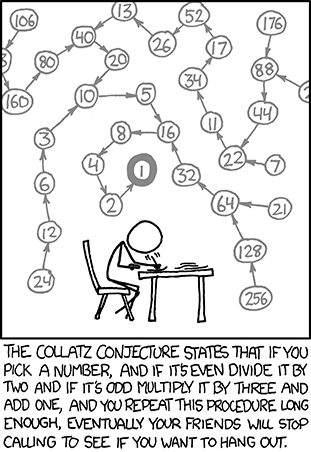
After an awesome longboarding session yesterday afternoon I decided to play around with infinite sequences in Haskell - it's supposed to be one of the more (most?) powerful features of Haskell - because it's a lazy language apparently.
My first impulse of creating a primes generator was nipped in the bud by a long page of prime number generators in Haskell. Scary, complex, mindboggling.
Project Euler posed a much better challenge: Which starting number, under one million, produces the longest collatz chain?
The solution I came up with was a simple brute force generator of infinitely many collatz sequences. Then I would take the first 1,000,000 find the maximum and that's that.
collatz :: Integer -> [Integer]
collatz 1 = []
collatz n
| odd n = 3*n+1:collatz(3*n+1)
| even n = div n 2:collatz(div n 2)
chains = [collatz x | x <- [1..]]
Didn't help.
So I started looking for the maximum a bit differently - take all the sequences, sort them by length and take the last one.
longest max =
last $ sortBy (comparing snd) $ zip [1..] $ map length $ take max chains
Great! It worked! But it takes ~26 seconds!
Well sorting maybe isn't the best idea ever, so let's try creating a list of sequences where the list's tail only contains those sequences that are longer than the head. A sprinkle of dropWhile and it was done.
longest' (max_i, max_l) =
let l = head $ dropWhile (\(i,l) -> l <= max_l) $ zip [max_i..] $ map length $ chains' max_i
in l:longest' l
~25 seconds!
That's odd ... even odder still is running both algorithms one after another only takes 33 seconds. Huh?
It would seem I'm using memoization incorrectly. I've heard it performs funny in recursive functions. The theory I formulated last night was that because haskell was lazy each execution chain was constructed to its end and the intermittent memoized values never got used until the whole function was called again.
Looking at the code samples this morning, though, I discovered this:
collatz :: Integer -> [Integer]
collatz = memoize col where
col 1 = []
col n
| odd n = 3*n+1:collatz(3*n+1)
| even n = div n 2:collatz(div n 2)
As you can see, I don't call the memoized function internally. Just goes to show what a night's sleep can do to one's coding abilities. I bashed my head against this problem for four hours yesterday and I never noticed I was recursing to the wrong function!
Interestingly enough, fixing that makes the algorithm spaz out and die after 16 seconds. The only output I get is "Killed". Curious.
Continue reading about Collatz, Haskell and Memoization
Semantically similar articles hand-picked by GPT-4
- Project euler is a fun way to become a better geek
- Lychrel numbers
- Learning me a Haskell
- Checking for primes? Dumber algorithm is faster algorithm
- An elegant way to randomly change every list member in Haskell
Learned something new?
Read more Software Engineering Lessons from Production
I write articles with real insight into the career and skills of a modern software engineer. "Raw and honest from the heart!" as one reader described them. Fueled by lessons learned over 20 years of building production code for side-projects, small businesses, and hyper growth startups. Both successful and not.
Subscribe below 👇
Software Engineering Lessons from Production
Join Swizec's Newsletter and get insightful emails 💌 on mindsets, tactics, and technical skills for your career. Real lessons from building production software. No bullshit.
"Man, love your simple writing! Yours is the only newsletter I open and only blog that I give a fuck to read & scroll till the end. And wow always take away lessons with me. Inspiring! And very relatable. 👌"
Have a burning question that you think I can answer? Hit me up on twitter and I'll do my best.
Who am I and who do I help? I'm Swizec Teller and I turn coders into engineers with "Raw and honest from the heart!" writing. No bullshit. Real insights into the career and skills of a modern software engineer.
Want to become a true senior engineer? Take ownership, have autonomy, and be a force multiplier on your team. The Senior Engineer Mindset ebook can help 👉 swizec.com/senior-mindset. These are the shifts in mindset that unlocked my career.
Curious about Serverless and the modern backend? Check out Serverless Handbook, for frontend engineers 👉 ServerlessHandbook.dev
Want to Stop copy pasting D3 examples and create data visualizations of your own? Learn how to build scalable dataviz React components your whole team can understand with React for Data Visualization
Want to get my best emails on JavaScript, React, Serverless, Fullstack Web, or Indie Hacking? Check out swizec.com/collections
Did someone amazing share this letter with you? Wonderful! You can sign up for my weekly letters for software engineers on their path to greatness, here: swizec.com/blog
Want to brush up on your modern JavaScript syntax? Check out my interactive cheatsheet: es6cheatsheet.com
By the way, just in case no one has told you it yet today: I love and appreciate you for who you are ❤️
